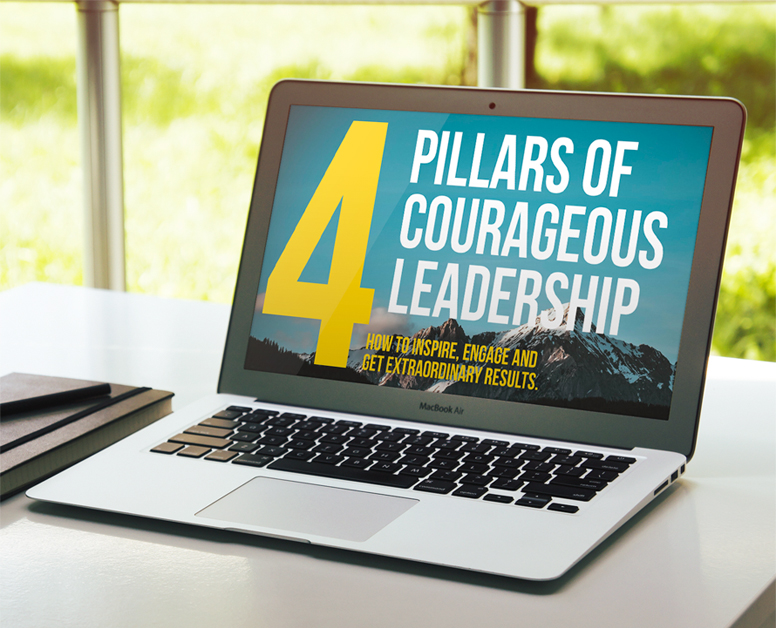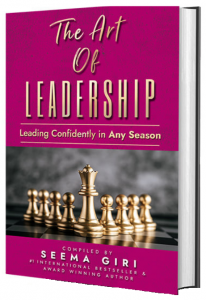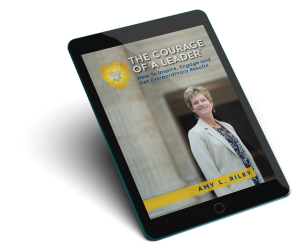My guest Laura Berger, Founder and CEO of Berdeo Group. has spent 2+ decades coaching exceptional leaders into the C-suite and boardroom.
Laura always has powerful concepts to share and illustrates them with real examples. In this episode she discusses how understanding how our brain works can make us exponentially more influential. You’ll love hearing from Laura.
About the Guest:
Laura Berger is the founder and CEO of Berdéo Group, a global leadership development consultancy. A pioneer in an evidence-based methodology the before-and-after leadership competencies of her clients, Laura has spent 20+ years coaching exceptional leaders into the C-suite and board room. Her twenty-year journey into executive coaching yielded her natural true north—enabling and empowering leaders to take their best actions toward their loftiest pursuits. A subsequent purpose-driven quest led her into government and public policy. In October 2020, Laura Berger became a Trustee at the Committee for Economic Development and The Conference Board. This membership puts Laura on the frontlines of cutting-edge public policy decisions, bringing a corporate perspective to policy recommendations delivered to Washington. What’s more, she has access to a unique and rare understanding of economic policy that enables her to impart to her Clients more solid thinking that gives them a more secure footing on the global stage.
The best way to reach Laura is by email, lberger@berdeogroup.com
About the Host:
Amy L. Riley is an internationally renowned speaker, author and consultant. She has over 2 decades of experience developing leaders at all levels. Her clients include Cisco Systems, Deloitte and Barclays.
As a trusted leadership coach and consultant, Amy has worked with hundreds of leaders one-on-one, and thousands more as part of a group, to fully step into their leadership, create amazing teams and achieve extraordinary results.
Amy’s most popular keynote speeches are:
The Courage of a Leader: The Power of a Leadership Legacy
The Courage of a Leader: Create a Competitive Advantage with Sustainable, Results-Producing Cross-System Collaboration
The Courage of a Leader: Accelerate Trust with Your Team, Customers and Community
The Courage of a Leader: How to Build a Happy and Successful Hybrid Team
Her new book is a #1 international best-seller and is entitled, The Courage of a Leader: How to Inspire, Engage and Get Extraordinary Results.
https://www.linkedin.com/in/amyshoopriley/
Call to action
Thanks for listening!
Thanks so much for listening to The Courage of a Leader podcast! If you got inspired and/or got valuable leadership techniques you can use from this episode and think that others could benefit from listening, please share using the social media buttons on this page.
Do you have questions or feedback about this episode? Leave a comment in the section below!
Subscribe to the podcast
If you would like to get automatic updates of new The Courage of a Leader podcast episodes, you can subscribe to the podcast on Apple Podcasts. You can also subscribe in your favorite podcast app.
Leave us an Apple Podcasts review
Ratings and reviews from our listeners are extremely valuable to us and greatly appreciated. They help our podcast rank higher on Apple Podcasts, which helps us ignite The Courage of a Leader in more leaders! Please take a minute and leave an honest review on Apple Podcasts.
Teaser for next episode
Tune in next for “How to Avoid Harmful Criticism and Give the Best Feedback for an Empowering Culture” with LaTonya Wilkins.
Transcript
Laura Berger is the founder and CEO of Berdeo Group, and has spent two plus decades coaching exceptional leaders into the C suite and boardroom. She always has powerful concepts to share and illustrates them with real examples. In this episode on the courage of a leader podcast, she discusses how understanding how our brain works can make us exponentially more influential. You'll love hearing from Laura.
Amy Riley:Welcome to the Courage of a Leader podcast. This is where you hear real life stories of top leaders achieving extraordinary results. And you get practical advice and techniques, you can immediately apply for your own success. This is where you will get inspired. And take bold, courageous action. I am so glad you can join us. I'm your host, Amy Riley. Now, are you ready to step into the full power of your leadership and achieve the results you care about most? Let's ignite the courage of a leader.
Amy Riley:Laura, I know that you have been seeking out resources about neuroscience and you continue to educate yourself about what we're learning about our brains. Why do you do that? Why are you a student of neuroscience? Okay,
Laura Berger:well, first of all, I'm gonna, like give you a bunch of resources that I've tapped in that I hope that, you know, you can, you know, share with others. And now I have a cat. So sorry. So all of our work is all of our work is evidence based, and, you know, more and more is being revealed about our brains, and, you know, the under workings of our brains. And that's fascinating to me, especially because, you know, fundamentally what we do is, is we're looking at behavior, and a lot of that behavior. There are, you know, your brain is an organ, your, your thoughts and feelings are, are very different and can be. And the brain kind of navigates and sets you up for how you move through those thoughts and feelings. So which then generates behavior, because then you're responding to your thoughts and feelings. So I just I feel like our brains have evolved over millions of years. And, you know, it's, there's so much out there now rich content that's out there. That why wouldn't we? Because it all fundamentally comes down to,
Amy Riley:to behavior. Yes, yes. Yes. I love how you language that this organ, this brain of ours has these networks of thoughts and feelings, and it all impacts the behaviors that we exhibit at work at home, in all realms of our lives. Yes, you mentioned some resources.
Laura Berger:Oh, well, so you know, Amanda Blake has a book and I actually have it called your body's your brain, I'll just hold it up here. You know, she, she talks about really kind of what I was saying in terms of, you know, how over these millions of years our brain has adapted to the social and like the the environmental, the social and emotional environment, I guess. Okay. And, and her data and research and it is phenomenal. So there's Amanda Blake's body's your brain.
Amy Riley:I'm gonna get that one. Yeah, you definitely
Laura Berger:want to get that one because, you know, ultimately, what we're trying to do is we're we're trying to connect, we're trying to feel safe, the brain is navigating that the brain is navigating safety. The brain is navigating connection that the brain is navigating respect, you know, all of these all of these nutrients. And she talks about that in her book. And I think that that really, that really speaks to our conversation today. Excellent. And I'll and I'll just throw in like as we're talking off for one more as we're as we're talking Okay,
Amy Riley:tiest pursuits. In October of:Laura Berger:I think fundamentally, it goes back to the those three core nutrients, the connection, the safety and respect, because as a leader, you know, at at the foundation of that is, is trust. And so when, when you're, when you're moving into a position in which you want to a leader is, is not a sole individual. I mean, a leader brings people along a leader follows. And foundationally you need to have trust, true connection, respect and safety. Because if you don't have those three tenants, how can you fundamentally have trust? Yeah, so. So understanding, you know, how the brain operates? I'll give you I'll give you a great example of this. So So let's, let's just like take it back to our childhood, take it back to or, and you, you as a parent, so when you know, when you see you're at a restaurant with your kids, and you see another child that is going under exploring, leaving the table, stepping away, maybe wanting to crawl under a booth, looking back, and you're looking at him going, Oh, are they getting in trouble? Are they you know, are they bothering that person, or I don't want them to bother that person. And you're just you're just, you know, they're exploring, they're out there. They're exploring, and that secure base that you are providing for that child as they're looking back at you going? Okay, mom's still there, and I'm not getting yelled at yet. You know, okay, yeah. Okay. Okay, I'm still there. And I can still see her in my sight. So I'm not too far away from my family. Right. This secure base. Yeah, that is that safety and that that connection, but it's also allowing, you know, your child to venture out? And, and know that that secure base is there. And now let's apply that to leadership. Yeah. And innovation and creativity. And, you know, how can you as a leader, provide a secure base, for others for for your peers, so that they feel comfortable in testing boundaries? You know, the child that oh, yeah, how far can I go? I'm bringing new ideas forward. In a way where, okay, failing fast, I mean, like, Hey, I got your back, you know. And so that secure base is, is fundamental. Now, let's talk about the brain. When you're not in a secure base. Mm hmm. You're in that fight flight. appease mode? Yeah. And you're in your, you know, the, the primitive part of your brain? Yeah, let's, let's go. And trust. If you are trying to gain the trust of an animal, are you going to barge in and be like, you know, yes, your amygdala is going to be reactive, and oh, i This doesn't feel safe. This doesn't? Well, same with as humans, we're the same. I'm not about to move into that, you know, that playful, connected nests. Because in the primitive part of your brain, your cortisol levels are upregulating. Yeah, because of that interaction. So that's going to prevent you from moving into your prefrontal cortex, which is where that connection and oxytocin levels are up. And you can, you know, create that environment, that social environment, yeah, to connect and to move into a space. That's more
Amy Riley:Yeah. And where our rational thought happens in the prefrontal cortex. So if we're or a leader that does something intentionally or unintentionally, that causes someone else's amygdala to go. This feels like a threat. Right. And then of course, we know our brains treat psychological threats the same as physical threats. So it's telling us to fight flight or freeze, and we're not running from a tiger. So we don't need the blood to rush to our legs for running, we need instead to not be in that amygdala hijack and move, have the brain activity move, like you said to the prefrontal cortex. Right? So constantly be thinking as leaders, how do we make it safe? How do we make it okay, how can that person share that idea? Say that vulnerable thing?
Laura Berger:Yes, yes. Well, and you know, when, when you talk about how leaders can make it safe. So it's interesting, because one of one of our clients, they're a publicly traded company, and one of their pillars, their culture pillars, is ease. We want, you know, our customers to feel a sense of ease, we, you know, want our employees to feel a sense of ease, like it's all about ease. And it was interesting, because the other thing about the brain is, often people forget about what's going on in the body, because the body is going to send, the physical body is going to send reactions to the brain, for the brain to respond. So when you when you talk about a sense of ease, what does ease feel like? Like in the body? What does ease feel like? And getting these clients to think, Okay, you're saying you're all about ease, but how are you moving into your meetings? And, and they were moving into their meetings with Eve? There? I mean, just lift your shoulders up. Yep. How's that make you feel
Amy Riley:at ease, tension, tension,
Laura Berger:tension, tension, and this is called proprioception and an interception is what it is. And so it's getting in tune with your body. And Amanda Blake talks about this as well. Of, of being able to be more aware of your sensations, because your sensations are ultimately going to send signals to your brain, that rapid heartbeat that oh, we're accompany these got a wound up? Yeah, all wound up. And then now let's talk about thoughts and feelings. Were completely at ease. How do you think you're really feeling when you're when you're moving into a conversation with someone that doesn't feel psychologically safe whatsoever? If you're intense like this in your heart beats going? A mile a minute, and what you're communicating may not, you know, come across the way that you intended to come across with ease. Yes, yes. That that safety. So how can a leader you know, create safety? Well, it's, it's getting in tune with their physical body, what is going on in your body in the moment, you know, I was on a call with the Chief Technology Officer, and everything was just going crazy with the with the board expectations and the system that they were implementing. And I said, Talk to me about, you know, like, what this feels like for you. And when he couldn't really connect to his body, because it's hard for people to connect. I said, Well describe it as a song. Like what comes to mind? And he rattled off, it was like a toad, the wet sprocket song or something. Yeah. And it's like, Oh, okay. And he's like, yeah, it's just like this up and down intense, intense and intense. And then I said, Well, what, like, how would you want it to feel like what song comes to mind? And he shared a song that he would sing to his son when took to create calm, perhaps. And it happened to be a journey song, I believe and okay, that just puts me puts me at ease and then this calm and so what is happening there is you are accessing your parasympathetic nerve, which is, you know, responsible for that. Feelings that we have and then you have the sympathetic nerve, which is, you know, where you know, Have you experienced anxiety and so shifting in your body so that you can actually access that parasympathetic nerve? Mm hmm. That sense of calm, can come from getting someone to think about what music creates that calmness for them. And then and then they can go into how it feels in the body. So I understand that some leaders have a real hard time talking about well, I don't know how it feels in the body, it just feels irritated isn't a repeals, I don't know. And shift it to something else. It can really help them navigate that
Amy Riley:you are so good at helping others tune in to what's going on with them and giving them various access points, like you were just talking about and sharing that example with your, with your client, right? That tuning into our bodies, if we can feel what's going on physically. Or if we can describe it with a song or a poem or a memory or something to help us access. How we're feeling that helps us understand if I'm following the logic here, what's going on in our brains, right? Like, what are the thought and emotion patterns that we're tapping into in that moment? That are probably going to inform what our next behaviors are going to be?
Laura Berger:Yes, yes. Well, and so what you're also talking about is, the neocortex is responsible for the scripts that we create, in our minds. So let's say for example, you know, you have a colleague of yours, and every time you have an interaction with them, this is, you know, oh gosh, it's just terrible. It's just, you know, stressful, and, you know, they don't listen, they're always cutting me off. They're interrupting me. And so what happens is that that script has been developed in your, in your neocortex. And so as you're moving into that conversation, you can choose to go into it with Oh, what's this person gonna do today? Again, oh, they're gonna cut me off here, or they're gonna, you know, make me feel this small or whatever it is. Or you can say, Okay, what's going on in my body? How can I move into this conversation from a place of calm from a place of ease? Yeah, shift the script?
Amy Riley:Who shifted the script? Yeah. I like that. Well, we have to have the awareness first, in order to shift the script, otherwise, we're gonna go in with our automatic reactions, which might be from an amygdala hijack the fight flight or freeze place? Yeah. Okay. So flipping the shifting the script. I've seen some videos out recently about neuroscience that we can actually change these patterns in our minds. Tell us more about how that works.
Laura Berger:Sure. So there's, there's a cup. Well, the first one that comes to mind is words. Words are powerful. And when you when you think about a word, there's meaning attached to that word, so for example, you context it's with words, that's what it means. That's what context means. And, you know, even if you don't know the actual meaning of that word, you attach a meaning to that word.
Amy Riley:Sure. Okay. Yep.
Laura Berger:So when you are shifting the, the pattern or the scripts of that individual that you are, you can't seem to have a good conversation with. Words matter. Yeah, Words matter. Incredibly. So when you think about the word terrorist, just just think about the word terrorists. And then what thoughts and feelings does that bring forward? Mm hmm.
Amy Riley:Terror out of control, the instability unknowns. I just want to try to protect people, my family
Laura Berger:and what do you think would be going on in your brain? Right now? Our tech terror? Yeah,
Amy Riley:yeah. Yeah, freak out like this. says, yeah, it's fight. Some of it is is flight to like, right. I just wanted to run away. I don't want to be in any circumstances where my family can be in harm's way.
Laura Berger:And now what about if I said freedom fighter?
Amy Riley:Yeah. Yeah. Pride, freedom, safety, security, banding together.
Laura Berger:And what's going on your brain right there. You're not in the hijack mode, you're not in the you're, you're in the Oh, freedom and, you know, banding together.
Amy Riley:I feel like I must be coming into the neo cortex where there's connection there's.
Laura Berger:Right, right. And hope and optimism and there's hope and optimism and, and so when you when you want to change that script, and you're in communication and dialogue with another leader, words are so powerful. Yes. You know, so if, if, for example, I was on a call this morning with a leader who was frustrated with the CEO, and telling me that she was feeling very defeated by the conversations that she was having with the CEO. And I'm like, well talk to me about the conversation that, you know, that, that you're happening, and, and she started sharing, very much defeatist, you know, dialogue of language, well, I'll do what you want me to do, or whatever, kind of discounting it like, Yeah, I'm going to do it, but I'm going to do it unwillingly. And, and, and so that's how she's choosing to move to move through that through that dialogue. And then I said, Well, you know, think about how what, like, what would great look like, for you? And for the CEO, what would that look like? Yeah, how would you describe that? What are the words that you would be using the dialogue that you would bring forward? And she said, And granted, this was prefaced in a prior conversation? She's like, how can we she said, how can we combine the best of our thinking to solve this? Okay, how can we combine the best of our thinking to solve this? There's nothing defeatist in that
Amy Riley:right moment. Yeah, very forward focused.
Laura Berger:So that is shifting the script. It's shifting the script for her. It's, you know, shifting the the dialogue in her conversation and interaction with the CEO. So that they can actually look at the future and not feel defeated and combine their their value
Amy Riley:thoughts. This is great, Laura, because it's easy to get into the circumstances where, well, that was just a really unmotivated conversation with my boss, right? I mean, anybody who just experienced that conversation would think the same thing. And here, we're saying, bring the awareness to that defeated feeling. And then you've got the power to shift the script. And you can say, okay, that's not what I want. What do I want? Right? How do I want to have influence? I mean, sometimes it sounds silly, but talking about opportunities instead of challenges talking about what we can do rather than what we can't do. And that what would great look like, what would be ideal, what do we aspire to, can bring our thoughts and emotions to a different place, which then brings about different behavior? Yeah, yeah. And
Laura Berger:increases oxytocin levels. And dopamine of like, Ooh, this is motivating. This is exciting. There's anticipation like a lot of dopamine is really associated having great impact in that anticipate, anticipatory process, like leading up to so when now you're in this dialogue leading up to your dopamine levels are, you know, ticking off and that's like food, this is a good space for us. So that defeat when you're defeated, lack of motivated, they're like, you know, your dopamine levels have to be totally tanked. Yeah.
Amy Riley:Yeah. So, Laura, talking about oxytocin and dopamine, is this a good place to loop back to the core nutrient of connection? Yes.
Laura Berger:It absolutely is. So it's the four the four are dopamine, oxytocin, serotonin, and endorphins. Those are the four
Amy Riley:chemicals from the main chemicals from the brain. Yeah,
Laura Berger:yeah. So, so I'm always saying get your healthy dose of these things. Ah, it's an acronym.
Amy Riley:We love a good acronym
Laura Berger:we love a good. So, so dopamine fuels exploration. And, you know, and helps you to move into that prefrontal cortex. And it's like, it fuels exploration, curiosity, and a simple way to, to boost dopamine is, is through expressing appreciation. Like, it's so simple, you know, yeah, to do that. And oxytocin, you know, you, you may or may not do this, but hang it, give somebody a hug, you know, associated with that nurturing and bonding, and it reduces anxiety and, and so oxytocin can also if you're, if you're not feeling connected, and you're, you know, wanting to create higher levels of oxytocin, pet, your dog, or your cat, I mean, that increases your oxytocin levels. Serotonin is it manages your mood, it, the production of serotonin can actually create more of a positive mood. And so when those levels are, are optimal, that's, you know, that's obviously affecting your thoughts and feelings as well. So if you're in a good mood, how you're going to behave, is in a way that is more creating connection versus whether or not whether you're, if you're in a bad mood, and you know, simply expressing like, things that you were grateful for, you know, like things that that you you have an appreciation for and appreciation for others. Gratitude practices, yeah, things such as that. And then endorphins. Exercise Exercise is excellent for for increasing your, your endorphins, because what endorphins do is they, they help you. They, they help you, there are good coping strategies. Right. So when you have those endorphins, they mitigate fear. And, and they're and they provide a good coping, they help with coping strategies. So exercise they think about when you when you're really upset, and then you you go for a run, and then all of a sudden, you're like, Okay, this doesn't feel so bad anymore. Because now you're, you know, you've decreased the fear, you've come up with something that's probably more reasonable in order to have that difficult conversation that you are gonna have. Because you, you increase your endorphins,
Amy Riley:it sounds like up could be perspective setting. Okay, I love that. So right now, Laura, everybody's talking about how we don't feel as connected. There's threats to connection because we're working in remote or hybrid situations. And non essential industries, we're not necessarily in the office together every day. And you're telling us find ways to release these connection, chemicals in our brains, and then we naturally feel more connected. And then as a result, we'll take actions to be more connected with others. Imagining then we might reach out or we might say more in that meeting, or we might acknowledge someone's contributions to the project in the last week. Yes, love it. And ways to access this. You talked about hug pet your dog, sound your snuggle your child practice gratitude.
Laura Berger:Exercise,
Amy Riley:exercise. Yeah, I often think about music. I don't employ this one enough. But how different songs can evoke different moods? You share this with your example with the client that songs were actually helping him access, what feelings he had and what feelings he wanted. Mm hmm. Like that song I can, that can better my mood.
Laura Berger:Absolutely can and and you don't even really need to play it. You need to just think you're, you know, we're going a mile a minute and we're back to back meeting and design. You're about to get on a call where you're sitting there going, oh, gosh, I gotta have this. You know, I gotta give feedback to direct report that is just not like lifting their weight in your opinion. Okay, so maybe you need to, you need to kind of think about that song and like, okay, and so you don't even need to hear it. You just need to have that experience of it of like, Oh, I love that song. Yes,
Amy Riley:yes. Oh, this was the I thought of this earlier in the conversation about shifting the script, actually changing our minds about something. And you just brought it back to mind for me, every time we just think about the song or play that through our heads, or say this is my intention, or envision what we want to have happen. Every time we do that, it's firing those neurons in our brain in a new way. And it's starting to create that path, which I think is so interesting, because sometimes we say, okay, to gain mastery, or to change something like you have to do it and do it and do it and do it and do it. Now more or what if I don't get opportunities every day to do it? Whatever it is, yes. But what we're learning about the brain now is that I can just think about it, envision it, practice it in my head visualize, and that actually is changing the pattern in my brain.
Laura Berger:It totally is that actually, so I'm reading a book right now called behave.
Amy Riley:Right here, another resource that he hates by rabbit, Robert
Laura Berger:Sapolsky Sapolsky. And he talks about, you know, the, like, words unconsciously shift your thoughts and feelings. So when you hear a word, it's not necessarily practicing a word, it's just, it's hearing a word and it unconsciously will will shift a thought and feeling for you. So the example that he, he gave was, it was called the prisoners. The prisoners game, it was an economic, it was an economic game of some sort. Okay. And he said that when they named the game, the Wall Street game, people were less cooperative. Okay, by the name, okay. Okay. Okay. Okay. I see them when they when they named the game, community game. Oh, yeah. People were more
Amy Riley:cooperative. Yeah. Yeah. Because I'm more interested in playing that game. Right. I have even had
Laura Berger:the rules of the game. Or the objective. Behind it, it was behind the game was, let's look at how people can be cooperative versus competitive. Like, that's definitely what it was looking. Yeah. And, and so when when you say, you know, all of these neurons are, you know, just they're changing in the moment, based on a word. Yes. And that's unconscious like that. Yes. They didn't even know that they were just in this study. And, and they noticed behaviorally when they said community game versus Wall Street game, the brain made an association. Well, with Wall Street, Wall Street, competitive stocks. Less cooperative, more competitive. More. Yeah, some unity. Oh, community. Yeah. And then they did another study, where they just rattled off words of like, hope and strive and, you know, compassion and just rattling them off like it. There was no meaning behind it. Yeah. versus, you know, more negatively, you know, tuned words. Yeah. And, and their whole behavior shifted.
Amy Riley:So interesting. Interesting. Yeah. I worked with a leader recently talking about the the power of what you name something, the titles of our meetings. Yes, we have the most boring, mundane titles for meetings, who wants to go to these meetings? And she and I talked about, like, there were there were strategy sessions. And when talking about what she wanted to accomplish in those strategy sessions, she wanted the team together to come together and talk about what great looks like. Yeah. So now the title of those meetings are, what does great look like? Right, like how do we create great art? I'd rather show up and participate in that meeting. Yeah. Okay, well, I feel like we can't wrap until we talk about the third core nutrient you mentioned earlier. Respect. Yeah. What are we learning about the brain that helps us demonstrate create respect in our relationships? Well,
Laura Berger:I think respect cannot be A present without connection. And trust, you know. And so back to just looking at the, the innards of the brain itself. If, if you're in a place where you're not trusting, if you're in the primitive part of your brain, where you're either appeasing as that client was doing, I feel defeated. You know, I really, you know, I'm not, I'm not trusting what she's saying to me and, and, and doesn't feel respected, it's very hard to then respect someone else. So think about when you're not feeling respected. Because you're, you're feeling disconnected. And you're feeling as if there's been a breakdown in trust of wow, you're not trusting the decisions that I'm making. How, like, respect gets eroded any respect for the person that you had, begins to erode over time. And, and again, once again, when you're in that, you know, primitive part of your brain. And you're now your, your heart's probably racing a little bit faster, you're, you know, it's your sympathetic, sympathetic nerve that's been activated, it's creating anxiety, there's no sense of calm whatsoever, you're not going to be able to access your prefrontal cortex. Yeah. Where that connection, and that oxytocin. Respect resides
Amy Riley:there. respect and trust, yeah,
Laura Berger:that resides there does not reside in, in the, in the permanent part of your brain,
Amy Riley:in the fear based portion. Laura, you have shared with us so many great concepts and practical ways to access them. I mean, first, talking about safety, right? How do you as leaders create a safe space for people to show up vulnerably and with their innovative ideas, talked about how ultimately, we can shift the script. But first, we have to be aware, and tuning into our bodies can be a great way to access that. So we can notice how we're thinking and feeling. Yeah, because that's going to inform our behavior. And we have to be aware in order to shift Oh, Words matter. That was powerful, Laura, thinking about how we're speaking to ourselves, how we're speaking to others, just even the words that we're using when we think about it, and then it runs through our head, release chemicals, like dopamine, oxytocin, serotonin, endorphins, and there's ways that we can release those chemicals in ourselves. And then that that has a showing up ready to connect with others. And I love this one, it's not generated within ourselves, we're not going to be able to generate it with others. So many great concepts and practical access points that you gave us today. Laura, thank you for your time. It was great. I could talk to you about this all day. And thank you for being on the podcast today.
Laura Berger:Thank you for having me. This was lots of fun. And you're right, we could go on and on.
Amy Riley:And we will put all the links to the resources that Laura mentioned in the show notes, so that you can check it out further. Thanks for listening.


 A Summary of The Courage of a Leader® 4 Pillars
A Summary of The Courage of a Leader® 4 Pillars




